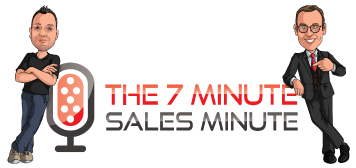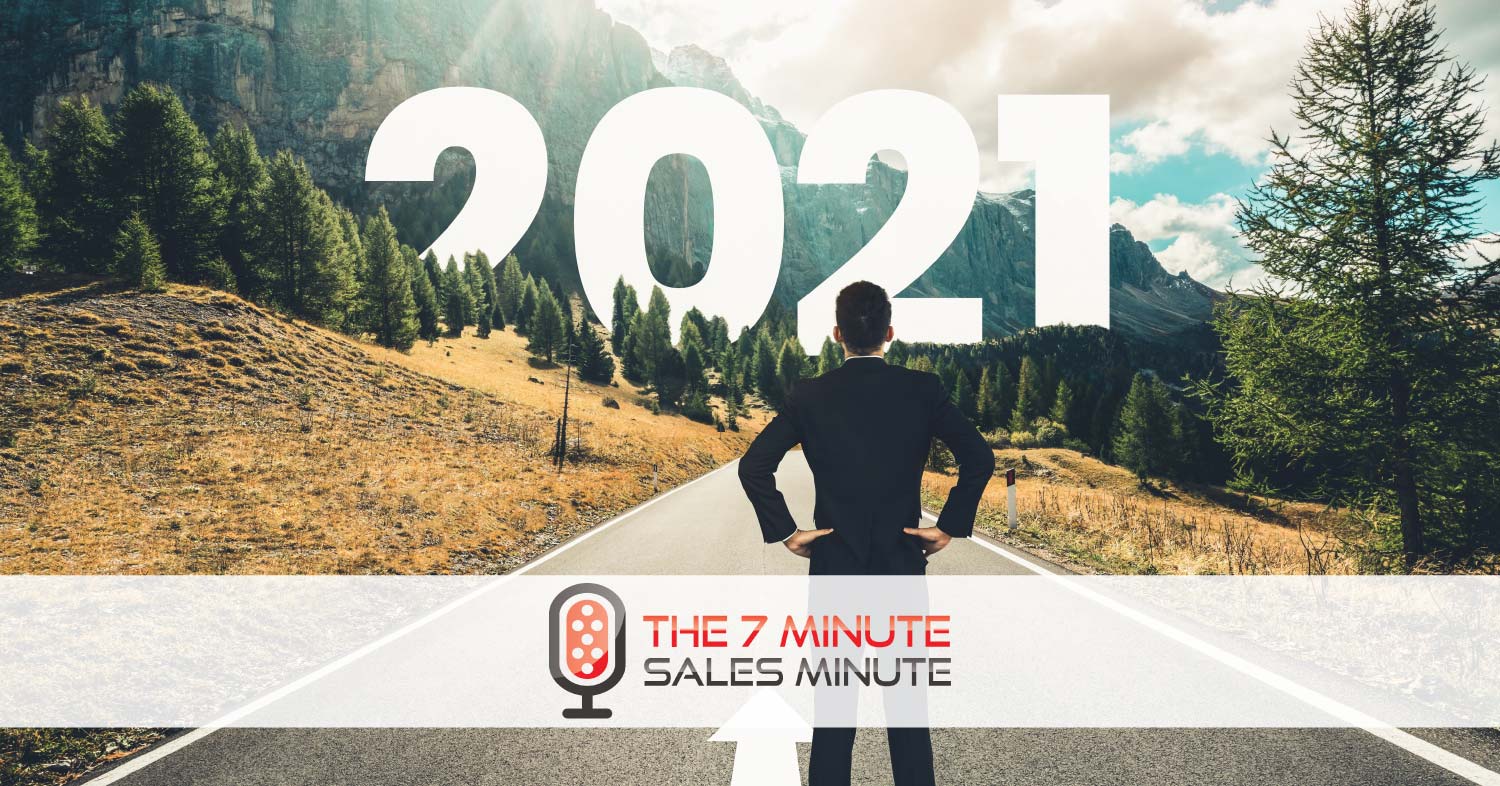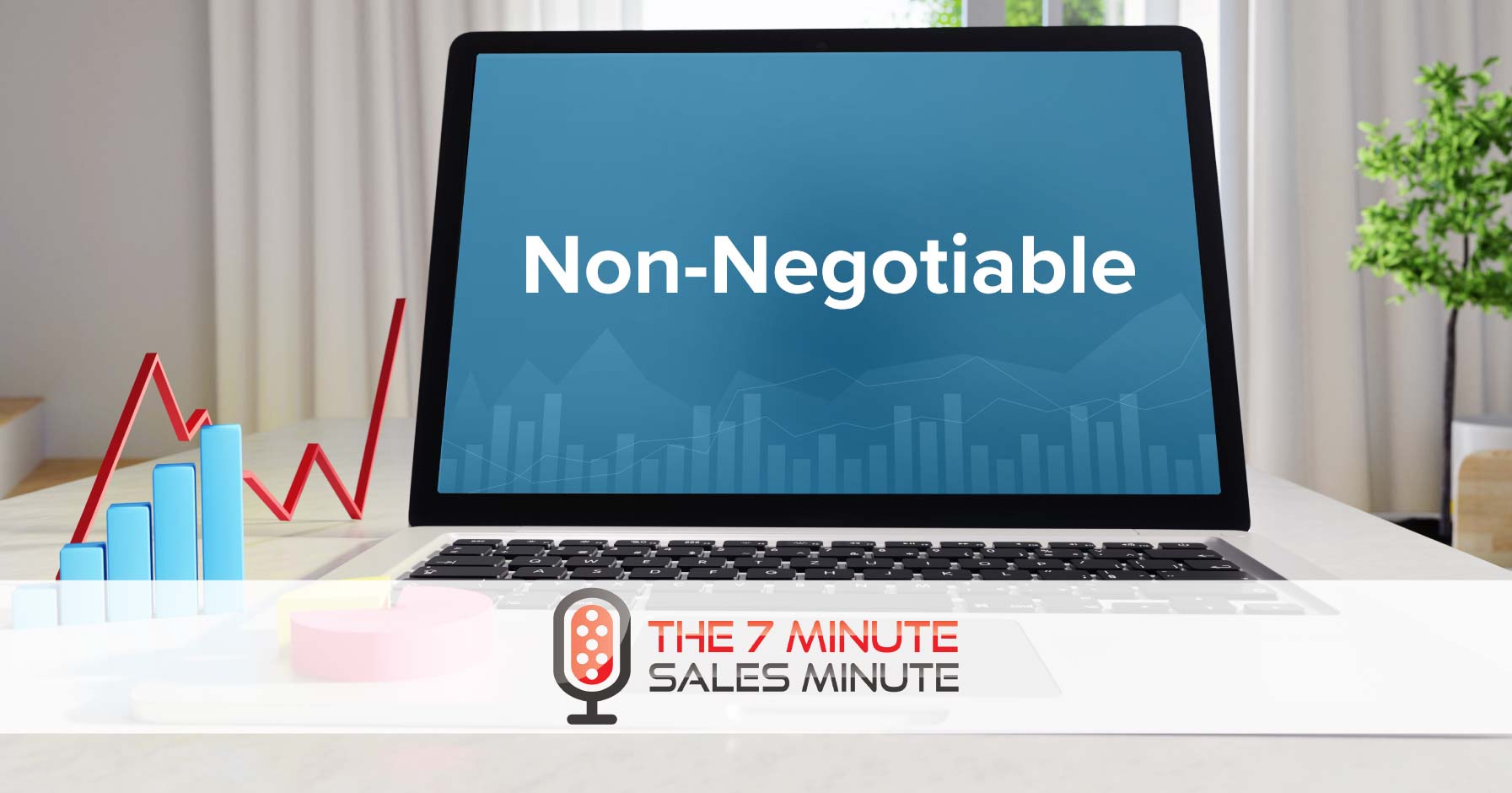
As we roll into 2018, the guys talk about getting a hot start to your year.
What can you do to ensure you don’t start 2018 with a hangover?
Read the full transcript
Scott Fishman: I’m Scott Fishman.
Jon Dwoskin: I’m Jon Dwoskin.
Scott Fishman: And this is the 7 Minute Sales Minute.
Jon Dwoskin: Welcome, everybody.
Scott Fishman: Hey, Jonny, how’re you doing today?
Jon Dwoskin: Fish, good morning. Happy new year. How are you?
Scott Fishman: I’m doing well.
Jon Dwoskin: It’s actually not morning, but I’m always used to saying “good morning” when we do these, typically in the morning.
Scott Fishman: Well, Jon, I’ll tell you, it’s morning somewhere. You’re good.
Jon Dwoskin: Happy new year, man. How you doing?
Scott Fishman: Doing great. Happy new year to you, man. It was a nice quiet New Year. I was in bed by 10:00. I don’t know about you.
Jon Dwoskin: I was in bed by 10:00 because we got back from vacation and I was tapped, but it was a great end of the year and I’m excited for 2018, as I hope all of our listeners are.
Scott Fishman: Yeah, for sure, and I think that rolls us in. We did some podcasts about how to end a year, and we have an idea about what we are going to talk about today to start the year.
Jon Dwoskin: Today, we’re going to talk about the January effect – getting back to work and getting back into the groove of business. But, not necessarily only bringing what you left in 2017, but about how we are going to a have a better, bigger, kick-ass 2018. We want to talk about what to bring with us, what to leave behind, and basically about enhancing and evolving the better part of what we do and what we want to do to evolve so we grow our businesses, our sales and our pipelines.
Scott Fishman: I like that. It’s funny because we just went through the first week of the year, and just looking around the office, going through my pipelines, speaking with clients, you can see the cobwebs are so prevalent. Everybody’s shaking it off. It’s one of those excuses, and we’ve talked about it before, “Talk to me after the holidays.” There’s never a good time, because now, after the holiday, you’re still catching up. There’s never a perfect time to do business, so I think it’s great that we talk about this now. There are a lot of good things here.
Jon Dwoskin: Yeah. Somebody gave me this great advice, and I don’t want to necessarily give the name of the person, because I don’t talk about who my clients mine are, but I’m going to call this person Rob Harrison. They gave me a great piece of advice, and I did this at the end of 2017. It’s a great exercise that can lead us into a great discussion today. First, I want to thank Rob for giving me this, because I thought it was incredibly insightful. I don’t actually know what the name of it is, I’m kind of making it up, but it’s called the Fire-Hire Exercise. Basically, at the end of 2017, I wrote out all the reasons I would fire myself in 2017, and all the reasons I would rehire myself for 2018. What it did is it really forced me to think about all of the nuances that weren’t working for me, so I could leave them behind in 2017, and then bring my best self and everything that I really wanted to grow and evolve into 2018.
Scott Fishman: That’s huge. I like that.
Jon Dwoskin: It was huge. It took me a while. It took me a couple of days, because I would work on it and then work on it some more another day. As you start doing it, you really get into some deep things, and it’s all about the kind of nuances that are the ultimate self-reflection. I think you and I are both big believers that what got you here won’t necessarily get you where you want to be. It was an outstanding exercise. I highly recommend it to whoever wants to spend the time doing it.
Scott Fishman: And whenever you’re doing an exercise like this, being honest is key, because you can tell yourself how great you are. We’re salespeople; we can sell ourselves. We’re our biggest client. You can sell yourself all day long, how great you are and how you have no weaknesses. But if you really dig down you get to the nitty-gritty, as we always say. You actually can find out quite a bit about yourself and also look at yourself from the outside in. You look at yourself from your customer’s perspective, from your coworker’s perspective, from your leadership’s perspective, and ownership perspective. There’s a lot of ways that you can really dig deep on this. I love it.
Jon Dwoskin: Yeah, well said. When you do this exercise, a couple things to note. One, if you want to do that exercise, put this on pause, do it, and then come back and listen to the rest of this podcast. Or just keep on listening and set some time to do it later. It really helps you get back into the rituals and the flow of 2018, and that’s what we’re going to talk about today. You don’t want to waste time. As of Friday, there was only 248 business days left in this year until December 31st. When you look at it that way, we don’t have a lot of time. The year is almost over, Scott. We got to take advantage of our time. We’ve talked a lot on past episodes about how much our time is worth. Let’s get the discussion kind of moving on how we flow in a positive way, with the accelerated momentum we want to get the year off with a bang, Scott.
Scott Fishman: I want to backtrack just one step on that and just look back a couple weeks to what we were talking about. I actually did a series on my blog about finishing strong as well, but I want to backtrack here. The biggest way to get a fast start and a hot start is to not actually put yourself into a different gear at the end of the year. Keep running. It’s important to always make changes and have that cutoff – here’s the end, and here’s the beginning. But I think we tend to slow down too much at times, and we take our foot off the gas and hit the holiday party mode. Go on vacation, great, but make sure that your business itself didn’t slow down too much, and you didn’t change gears before the end of the year. Then it’s that much harder to ramp up at the beginning of the year because you’re already so far down in your effort level. You have to get back up and gear up to get there. So, let your effort hit until that very end. Don’t slowly coast through to the end of the year.
Jon Dwoskin: That’s a great point and a great tip. I just want to kind of reverse engineer that a little bit more and look forward. I think one of the things that most all business people do is they run as hard as they can and they don’t take time to take a vacation or take a day off or a half-day off, and so they burn burn burn burn burn burn until they say, “Once I get to this … In December, I’ll relax.” You have no choice when you hit that wall, but to go from 100 miles an hour to negative or zero, so it’s much harder to ramp up. This year, one of the things that you’re looking at in 2018, is to have a little bit more balance in your year. And, don’t hear that like “Oh, well the Millennials need balance,” or this, that or the other, but everybody needs a little bit more balance. I took Strategic Coach for a year, and one of the things they talk about is you have to have your days off, when you schedule time off. That’s how you actually get sharper: when you grow your business.
Scott Fishman: Right. It’s okay to walk away sometimes.
Jon Dwoskin: Yeah. Walk away a little bit more in 2018, is what I’m hearing you say, so you can keep a consistency throughout the year and not just go to zero.
Scott Fishman: Exactly. The stops and starts. Keep consistent, yes, absolutely. I think we do have to figure out what didn’t work last year, and doing that exercise, a hire-fire exercise is a great way to do it. And just taking stock of our business and looking back at the clients that we won, the clients that we lost, and figuring out what mistakes we made and being honest with ourselves to make those changes. We also talked about other things, as far as metrics go. We figured out our key performance indicators a couple of episodes ago. If we know that this is the lever that makes the move for us, that makes he change, and gets that delta from A to B, or B to C, or whatever letters you choose. Whatever we do, whatever that key metric is, work on that and what you can change. What we did last year isn’t going to get us to our goals this year. If you set the exact same goal this year as you did last year, you’re not trying to grow.
Jon Dwoskin: I want to talk about the KPIs. We talked about whether they come after the business plan or actually before the business plan. But, regardless, it’s the importance of planning. The key thing is, if you’re listening to this podcast right now, the beginning of January 2018, you should have a very detailed business plan for the year. You should have a roadmap, knowing exactly what you’re going to be doing the entire year, broken down by quarter, broken down by month, broken down by week. In many instances, I’m a big fan of by-the-day, especially for salespeople. Make sure you have that plan and take time every single day to plan. A business plan is a fluid document that you should be looking at minimum once or twice a day. It is something that you should be updating and you should be preparing every day for the upcoming day.
Scott Fishman: It’s your roadmap. If you can check multiple times a day, to see if you’re actually on track, if you’re going to reach your destination.
Jon Dwoskin: If you want to get ahead in 2018, make sure that that business plan is locked and loaded and you are just ready to make it happen.
Scott Fishman: We talked about looking at the past here, and looking at what we had done last year. When you do discover something – a customer that you could have closed, that you somehow failed, or you dropped the ball somewhere because obviously you didn’t close it – reverse engineer that. What could you have changed? What could we do differently this time, this year, when we make that move? How could we adjust so that when we talk to Acme Products, they’re going to become our customer, versus them going to our competition, or talking them out of doing business altogether, which I think happens a lot more than someone just going to our competition. Sometimes we talk them out of doing things.
Jon Dwoskin: And be open to the feedback, and ask people for their feedback. It’s great to self-reflect, like we talked about the fire-hire exercise, but if you really want to take it to a deeper level, show somebody else the fire-hire. Ask somebody for feedback and ask them what they believe you should have or could have done differently.
Scott Fishman: That fire hire thing reminds me a lot of when we used to do 360s quite a bit. It was very interesting to see how people saw you. That’s one of the reasons why I say that when you’re going through and looking at yourself through different lenses, look at yourself from the ownership perspective. Does the owner of your company even know your name? And that’s kind of crazy to think, but they might not. There’s a couple layers of insulation there. If they don’t, if they don’t have an opinion of you, how could we get them to form an opinion of you, and the right opinion? Something to think about.
Jon Dwoskin: Whether you ask for feedback or not, it’s always good to have the relationships where you get feedback. Don’t take anything for granted. Fish and I have been friends for 30 years, but the other day I sent him a text and then he sent me a text reply that said, “Maybe we should do an episode on how to manage your tone in text.”
Scott Fishman: The tone over text and email and how tone gets lost.
Jon Dwoskin: We laughed about it. I thought I was being fine in my communication, but he basically said, “Dude, slow down. Don’t be so direct.”
Scott Fishman: It was the equivalent of, “Hey, can you check the oil, buddy?”
Jon Dwoskin: Don’t take people or things for granted, no matter how well you think you know them, and how long you’ve known them. You always got to be up on your game and hope that the people around you are going to give you that feedback, no matter how small it is, so it doesn’t seep into other things. That’s important.
Scott Fishman: I want to touch on something, here, Jon, and this is going to be maybe unpopular, because the popular notion here is very, very popular and far-reaching. We talked a little bit offline about new year’s resolutions. I know the big popular thing is to say, “Oh, don’t make new year’s resolutions; you’re never going to keep them. They suck. You shouldn’t just do something on a start date.” You know what? I don’t give a s@*#. If I want to make a change, and it just so happens that it’s January 1st, that’s a great fricking day to do it. People want to say don’t have resolutions because you’re going to fail. You know what? If you’re going to fail, it’s because you’re weak. It’s not because of the day you chose to start. If new year’s works for you, do it. Call it a new year’s resolution. That’s fine. Don’t let the masses that want to say that new year’s resolutions are bad kind of force you into thinking that you have to start on December 20th, or January 15th, or your birthday, or whatever. There are always times when you can start something and you can stop something.
Jon Dwoskin: I love that, Fish, and I think we should invent something new today. On the first of every month, just make it be your personal day, not you, Scott Fishman, but anybody. Like a target date to update those resolutions.
Scott Fishman: I like it. Take stock.
Jon Dwoskin: Take stock the first of every month, or the 31st of every mont. Take stock on the previous month and get ready for the upcoming month. You can do the fire- hire exercise the last week of every single month, before you move into the next month. It doesn’t have to be a yearly piece. If you’re growing, and your business plan is fluid, and you’re constantly ahead of real time with things, then you want to always be doing that. I agree with you.
Scott Fishman: There’s a guy that I’ve worked with quite a bit, CEO of a very large company. One of the things that stuck with me that he said is, “There is not a day that I wake up that I’m not scared that I’m going to get fired that day.” It blew me away. It hit me. I’m like, “You? Why would you even think that?” He’s like, “Because if I’m not taking chances, if I’m not taking risks, I’m just playing it safe, I’m not giving a chance to get fired. I want to know that, hey, if I don’t do my job properly, I don’t succeed, I don’t grow. Tomorrow, they might hire somebody else to do my job.” I think that’s great. That’s why I think the fire-hire thing is great. I want to be honest. I probably have five days out of the month where I get to the end of the day and think, I’d probably fire myself for some of the crap that I said on the phone today (just because I’m kind of out there with my clients, but they love me for it). It’s kind of a funny thing the way I do business, but there are some times where I’m like, maybe I took it a little too far today. I like the fact that doing the fire-hire, literally, almost on a daily basis.
Jon Dwoskin: You know what scares the s@*# out of me is complacency, almost to an obsession, as far as growing, and learning, and reading. I think you and I, Fish, are both on the same page when it comes to listening to podcasts and reading and just always wanting to be better and growing. Complacency for myself scares the hell out of me. There’s that old–I can’t remember if I’ve ever talked about it on this podcast, I think I may have–kind of the analogy about the boiling frog. Have we talked about this?
Scott Fishman: Yeah.
Jon Dwoskin: I’ll say it really quickly. If you throw a boiling frog in hot water, its instincts will be to jump right out of the hot water. But if you put a frog in just some warm water and you slowly boil it, it won’t realize that anything is wrong and it will basically boil itself to death. Because it becomes complacent. If anything, if you can get rid of anything in 2018, don’t be complacent and be more decisive. Plan a little bit better, be specific, be measurable, always know your leading activities of what you need to do to grow your business. Always know why you would fire and rehire yourself, and bring your best self to whatever you’re doing, whether it’s the next minute, the next hour, or the next day.
Scott Fishman: I love it. I think that about wraps us up for the day, but I do want to say thank you to our community for much of the feedback we’ve gotten recently. Again, it’s a labor of love that Jon and I do this. You may have noticed that we had a sponsor for a little while. We decided we’re not doing any sponsors on this show at all. We do have our products that we sell, but at the end of the day, we do this out of love for you guys. We want to help you grow, because it does help us grow in doing this podcast ourselves. The feedback the community has given us is great, and we just want to say thank you very much for everything you’ve done – for the reviews, for just the moral support we receive. It’s overwhelming.
Jon Dwoskin: Thanks so much, and I am going to put in a little bit of plug: if you are getting a lot of value out of this, please post a review for us. It’s something we tend to forget to ask about because we love doing it, just for the love of doing it, but if you can put some reviews on iTunes, that’d be great.
Scott Fishman: Thank you very much, everybody.
Jon Dwoskin: Have a great year and have a great day. We’ll talk to you soon.
Scott Fishman: Thanks for listening.




